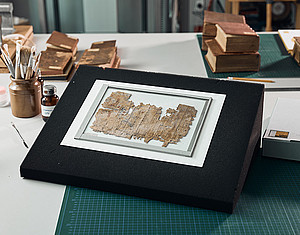
Sensational find
The mummy book rewrites the history of the book
Alumni in Portrait January 2024
In the spring of 2023, the oldest known fragment of a book in codex form in the world was discovered at the University of Graz. A sensation that rewrites the history of the book.
Text: Eva Schlegl
Theresa Zammit Lupi was actually carrying out routine work on papyrus fragments. But then the restorer discovered a thread remnant on an Egyptian papyrus from the 3rd century BC and the routine work turned into a sensation. In May 2023, Theresa Zammit Lupi discovered the world's oldest known fragment of a book in codex form at the University of Graz. It can be dated to 260 BC and is therefore around 400 years older than previously known first books. The discovery will push forward the previously scientifically accepted timeline of book history.
The papyrus fragment, measuring only around 15 x 25 cm, has been in the possession of the University of Graz since 1909. It was discovered during an excavation in the Egyptian necropolis of Hibeh (today El Hiba) south of Fayum (El-Fayoum). The city of Graz helped to finance the excavations. In return, it received 52 papyrus fragments, which were handed over to the special collections of the University Library. Some of the papyri were used in the Ptolemaic period (305-30 BC) as so-called cardboard wrappings for mummies.
The Graz mummy book is a double page from a notebook in which beer and oil taxes were recorded in Greek. The rest of a binding thread gave restorer Theresa Zammit Lupi the clue that it could be a book fragment. Further examination revealed that it was a fragment of a papyrus in the form of a codex, and by no means a scroll, as the sheet also shows traces of a center fold and traces of stitching (sewing holes). The text is arranged in columns. It was previously assumed that the book form was only created after Christ. The earliest known codices with evidence of stitching in book form have been dated to 150-250 AD and can be found in the British Library and the Chester Beatty Library, Dublin.

This sensational find shows how important it is for libraries to remain places where work and research is consistently carried out to preserve historical cultural assets, even in the age of advancing digitization. Pamela Stückler, Head of Graz University Library: "It is thanks to the expertise of the Special Collections team at the University of Graz that a fresh look at digitized objects that have been known for a long time - in this case the Graz Mummy Book - has led to new insights." Peter Riedler, Rector of the University of Graz: "The discovery of the historically significant book fragment confirms the importance of the work of the researchers at the University of Graz. It is also a mandate to drive forward further research in this field."

How did you discover that it was a book?
Theresa Zammit Lupi: First I saw a piece of thread, only then did I notice the format of a book. I saw a central fold, the stitching holes and the written text within clearly defined margins on the papyrus.
What was going through your mind?
As a restorer, it feels very special when you come across a discovery like this and can contribute a building block to the history of the book. At the same time, you think it's surreal. Like watching a movie. A bit like Indiana Jones at the University of Graz.
How quickly did you realize what it was all about?
At first I was completely perplexed. Then I went through a phase of denial. I seriously doubted and researched for days and weeks to be sure of this fact. Then came the phase of acceptance and the realization: this is it. And finally: joy. It was a wave of emotions.
Restoration
Graz University Library is the only university library in Austria to operate a restoration service as part of its special collections. Take a look behind the scenes of the University Library and the restoration studio with us and find out more about the daily work of Theresa Zammit Lupi.